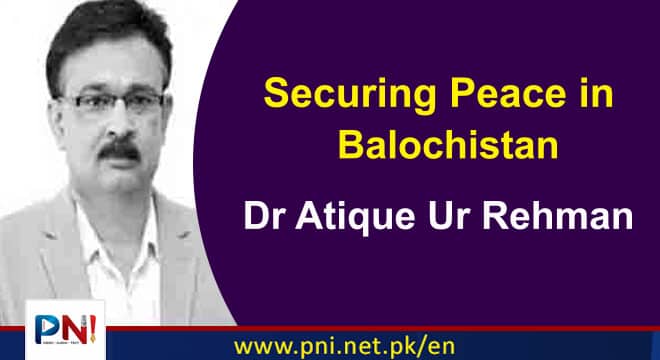Prime Minister of Pakistan and COAS’s frequent visit to Balochistan in last few weeks signify the priority government and security agencies attach to peace in the province.
COAS on Tuesday visited Balochistan and stated that the nexus between the internal collusive elements and external forces to create instability has amply been exposed to the people of Pakistan. He lauded the efforts of security forces for securing peace in Balochistan.
Political leadership of Balochistan has also appreciated the success of security forces for arresting Imam and other high value targets. They noted in various statements issed to press that Some foreign elements and misguided individuals / Baloch Tribes have hijacked
the vision of Balochistan; The Balochs needs to rise and confront these elements.
While the geopolitics of Indian ocean regions and connectivity is at its best, Balochistan has attained significance not only for BRI, China’s initiative of connectivity but also for Indo-Pacific regions. Indian quest for hegemony in Indo-pacific makes Balochistan vulnerable. A complex network of proxies had been laid by India in Balochistan to sabotage the peace to disrupt development in the province.
The Baloch insurgency has been a thorn in the side of Pakistan for decades, and it has been a source of concern for its neighbors and the international community.
It was a long battle between Pakistani security forces and Indian proxies in Balochistan.
The tide has been turned. Arrest of Gulzar Imam Shamay, head of the Baloch National Army (BNA), terrorist organisation indicates that the state, LEAs and premier intelligence agencies are cognizant of the challenges and in full grip of the militant landscape.
The arrest of Imam challenges India’s interests in Balochistan, while benefitting Pakistan and China, which has invested billions of dollars in the China-Pakistan Economic Corridor (CPEC), a flagship project of its Belt and Road Initiative that passes through Balochistan.
The CPEC has faced opposition and attacks from Baloch militants.
Indian propaganda over the human rights violations in Balochistan has failed to gain traction. And to add insult to injury, Indian conspiracy to destabilize Pakistan has been neutralized by Pakistan’s intelligence and security agencies. The arrest of Gulzar Imam, also known as Shambay marks a major victory for Pakistan in its fight against Baloch separatists.
The BNA is a banned militant organization that has been active in the southwestern province of Balochistan for years.
Balochistan, Pakistan’s largest and poorest province, is rich in natural resources such as gas, coal, copper, and gold. However, it is plagued by underdevelopment, corruption, and violence. Baloch militants have been carrying out a low-intensity guerrilla war against the Pakistani state for decades, targeting security forces and civilian installations.
The arrest of Imam, a high-value target, is the result of a months-long intelligence operation. Imam was involved in dozens of terrorist attacks in Pakistan and had links with hostile intelligence agencies.
Arrest is also a setback for India’s alleged strategy of using Baloch proxies to undermine Pakistan’s stability and security.
Baloch insurgency is not a monolithic movement, and there are multiple groups and factions that have their own agendas and strategies. The arrest of one leader may not necessarily weaken the entire movement, and it may even provoke retaliatory attacks and further violence.
Therefore, it is crucial for Pakistan to adopt a comprehensive and inclusive approach to address the Balochistan issue and to engage all stakeholders in a meaningful dialogue.
#Balochistan #PakistanNeedsUnity #IntelligenceAgencies
#LEAs #AsimMunir
#Shambay #Gulzar








